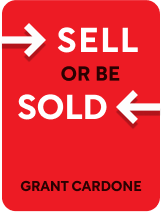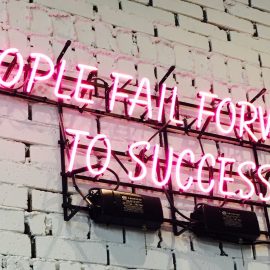

This article is an excerpt from the Shortform book guide to "Sell or Be Sold" by Grant Cardone. Shortform has the world's best summaries and analyses of books you should be reading.
Like this article? Sign up for a free trial here .
What sales training ideas can you use to improve your skills? Why is sales training so important?
Listening to audio and video programs about sales, role-playing sale scenarios, and taking notes on your interactions with customers are all sales training ideas that will help boost your sales skills. Sales training is very important because talent alone cannot make you a master salesman. You need training to master customer behavioral patterns, which enables you to predict buyer actions.
Read on to discover practical sales training ideas for personal and organizational training programs.
The Importance of Sales Training
The second step to becoming a master salesperson is training. Even if you have natural talent, if you don’t cultivate it, you’ll never succeed. Talent alone won’t stand up against recessions, competitions, and changes in the industry.
Sales isn’t part of the school curriculum, so you’ll have to take the initiative to learn it on your own. This will give you an enormous advantage because you’ll be one of the few with this rare skill. (Most salespeople don’t read books about sales.)
Many people object to training because it’s expensive to attend seminars and buy books, but as you improve your game, you’ll sell so much more that you’ll quickly recoup your investment. (Additionally, if you do the math on how much money you lose by missing sales, the numbers will prove the value of training.) Put as many hours and dollars into your sales training as you put into your attire.
A good training program must be both theoretical and applied—this is why you need the sales training ideas below to ensure you know what to do when you encounter particular circumstances. Applying these sales training ideas will help you learn and memorize behavior patterns to the point where you can predict people’s actions, which is the mark of an expert in any field. You might:
- Carry around a notebook and write down every objection customers give you. (When Cardone did this, he became so familiar with common objections that he could predict them well enough to address them before customers even voiced them.)
- Consider it a learning opportunity when you lose a customer to a competitor. Analyze why the competitor or product might have appeared more attractive than your offer. You can even ask a colleague, ideally a manager, to call the client and ask why she didn’t buy from you.
Even if you’ve been in sales for a long time, you need these sales training ideas to ensure constant professional development. Mastery doesn’t automatically come with time—you have to work for it.
Individual Training Program
Here are Cardone’s sales training ideas for individual salespeople. Ideally, do each step every day:
- While you’re driving, listen to audio programs about sales. Choose programs with concrete information (for example, how to handle an objection) rather than motivational programs.
- Watch 2-4 video segments that train the sales process at some point during the day, such as the ones on Cardone’s website.
- Practice role-playing scenarios to prepare for situations that make you uncomfortable or that you have trouble succeeding in.
- Take notes or record your interactions with customers so you can analyze them. This kind of observation improved Cardone’s productivity by 200%.
- For example, Cardone videotaped himself talking to customers and studied his body language.
- Whenever you lose a sale, reflect on why. Consult Cardone’s books and videos for help with diagnosing the problem.
Additionally, you should do some product-specific training so you can credibly answer customers’ questions about the product and tell them about its features and value proposition.
Organizational Training Program
Here are Cardone’s sales training ideas for organizational training. The program must:
- Include daily practice. All staff meetings should feature training and people should practice on their own throughout the day.
- Act as a warm-up. Training should take place just before encountering real sales situations.
- Focus on selling situations. (Many programs focus on motivation rather than concrete scenarios.)
- Use short (less than five minutes), interactive sessions to keep the trainees’ attention.
- Be measurable. You should be able to track and reward people’s application of the training. But overall, if training doesn’t increase sales immediately, it’s not being used effectively or often enough.
- Focus on the best salespeople. To engage them, the training should be cutting edge and contain new information, not just basics.
- Be accessible. Whenever someone runs into a problem, they should be able to access materials that will help them solve it.

———End of Preview———
Like what you just read? Read the rest of the world's best book summary and analysis of Grant Cardone's "Sell or Be Sold" at Shortform .
Here's what you'll find in our full Sell or Be Sold summary :
- How your happiness and even survival depend on your selling ability
- The five steps to becoming a master salesperson
- Step-by-plans to lead the customer to make a purchase






